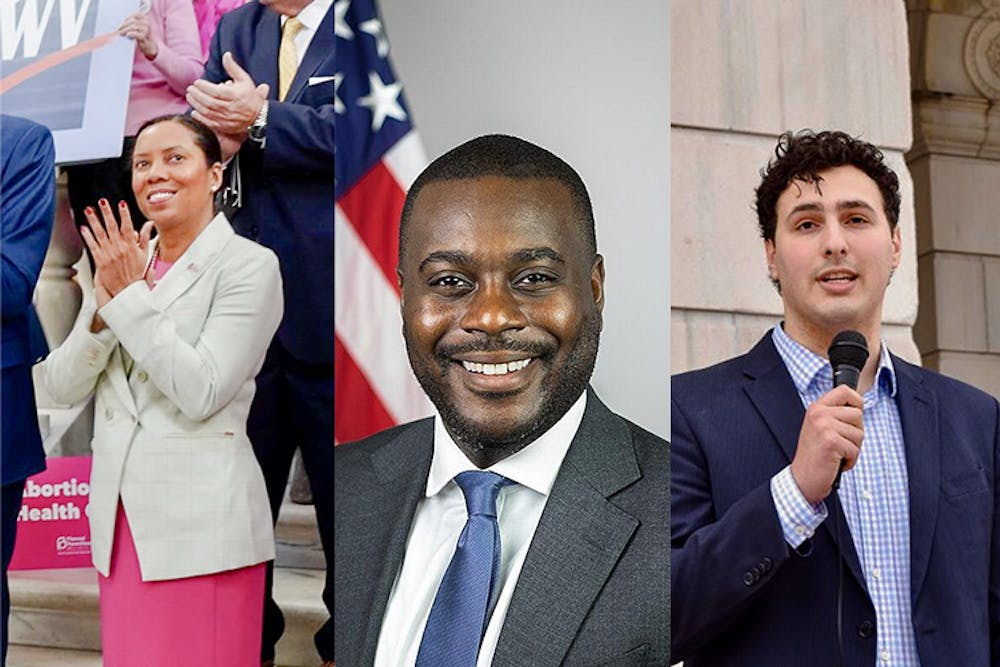Gabe Amo, a former White House aide under the Obama and Biden administrations, won the special Democratic primary election for Rhode Island’s 1st U.S. Congressional District Sept. 5. The results, as in any election, led to abundant analysis of what the race might signal for politics in Rhode Island and nationally.
According to official numbers certified by the Rhode Island Board of Elections Wednesday, just under 40,000 voters cast their ballots in the Democratic primary, with more than another 4,000 voting in the Republican primary. Amo won with 32.4% of the Democratic vote, beating 11 opponents, including runner-up former state Rep. Aaron Regunberg who finished with 24.9% of the vote.
Wendy Schiller, professor of political science and director of the Taubman Center for American Politics and Policy, was surprised by the results of the election, specifically Amo’s “late week surge.” She noted that in a crowded primary election decided by less than 3,000 votes, small things make a big difference, particularly likeability.
“He’s had no negative press, no scandals, no missteps, and I think a lot of voters said, ‘Well, that’s someone who’s really appealing,” she said.
The same can’t be said for several of Amo’s competitors.
Regunberg was criticized for receiving support from a super PAC funded by $125,000 in donations from his father-in-law and mother, which Schiller said “undercut his reputation as a liberal progressive.” Lt. Gov. Sabina Matos, an early frontrunner in the race who finished with only 8% of the vote, also struggled amidst negative press. Her campaign was accused of forging nomination signatures, including the names of people who were dead. The Matos campaign blamed a contractor hired to collect signatures.
Matt Rauschenbach ‘23, Amo’s communications director, attributed Amo’s victory to the strength of the campaign’s on-the-ground outreach, as well as the popularity of the candidate’s message, which heavily emphasized his background in government.
“Voters were looking for somebody who is ready to deliver for Rhode Island on day one,” Rauschenbach said.
The message trickled down to voters like Valerie Andrews, a public services assistant at Brown University. “He seems to have some very good experience,” she explained outside a polling place on Providence’s east side last week. Andrews noted that Amo’s prioritization of gun control won her vote.
Amo now faces Gerry Leonard, a former U.S. Marine Corps colonel, in the general special election Nov. 7, but the race is unlikely to be close, as registered Democrats in the district vastly outnumber registered Republicans. President Joe Biden carried the district by nearly 30 points in the 2020 election.
Rauschenbach said the general election campaign remains focused on bringing together all of the factions of the Democratic primary. Amo was considered a more moderate and establishment Democrat than his main competitor Regunberg, who was endorsed by U.S. Senator Bernie Sanders (D-Vermont).
Last Sunday, Gov. Dan McKee, Matos and U.S. Senators for Rhode Island Jack Reed and Sheldon Whitehouse, along with other top Democrats in the state, attended a press conference to endorse Amo.
Regunberg also expressed his support for Amo in a post on X, formerly known as Twitter, adding that he would communicate with his “supporters about (the) need to back (Amo’s) campaign.”
While some see Amo’s victory as a blow to progressives in the state, Schiller said she doesn’t think that the election offers much clarity about Rhode Island Democrats.
“I don’t think you can conclude from this primary that Rhode Island is more liberal or less liberal,” she said. “What you conclude is voters are looking for candidates who don’t have any scandals, who are authentic and who they can relate to.”
Amo is now almost guaranteed to become the first person of color to represent Rhode Island in Congress, which Schiller said was “long overdue.”
“We are a very diverse state, and our elected officials and elected leaders have not reflected” that, she added.
Rauschenbach said that Amo plans to take “all of the parts of his identity, being a Black man, being the son of two West African immigrants, and use that to represent Rhode Island in Congress.” But he also noted that Amo’s decision to run for Congress was ultimately “about making a difference, not making history.”
Schiller believed that Amo’s background — he grew up in Pawtucket as the child of Ghanaian and Liberian immigrants — resonated with voters and ultimately helped propel him over the top.
The results also highlighted the importance of recruiting diverse candidates “who can identify with local district voters” in the 2024 election cycle, according to Schiller, including those who were born or have lived in the district they are seeking to represent, such as Amo.
She added that the Democratic Party must vet their candidates thoroughly in the future in order to avoid scandals like those seen in this year’s special primary.
According to Rauschenbach, the election signals the popularity of President Biden’s policies in Rhode Island. He noted that Amo “did not run away from the Biden-Harris administration(‘s) historic legislative achievements.”
Still, the sample size was small, with just over a quarter of registered Democratic voters participating in the primary. Nearly a week after the election, 1st Congressional District resident David Campbell was still left asking a simple question: “Who won?”
Campbell said he had originally planned to vote for Ward 1 Councilor John Goncalves but ended up not voting at all, believing Goncalves was too far behind.
Voters’ perception of frontrunners, though, relied exclusively on internal polls: An internal survey from Amo’s campaign released in late August put Regunberg in the lead with 27.9% of the vote, with Amo in second at 19.1%, but its validity was criticized.
“We felt an obligation to let people know that these were your two choices ultimately,” Rauschenbach said when asked about any political strategy in the release of the internal poll. “Outside of that, there really wasn’t a huge calculus on our end.”
Schiller called the release of the poll and its timing “smart campaigning.”
“He was saying, listen, ‘I’m in range, if you don’t like Matos and you don’t like Regunberg, I’m a really good alternative who’s got a chance to win,’” she said.

Jacob Smollen is a Metro editor covering city and state politics and co-editor of the Bruno Brief. He is a junior from Philadelphia studying International and Public Affairs.





